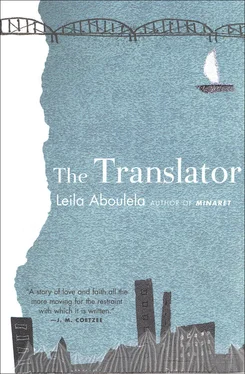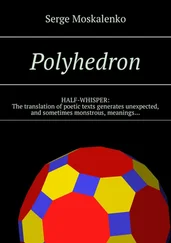She thought as she drank her tea that she was in a real home. She had not been in a real home for a long time. She lived in a room with nothing on the wall, nothing personal, no photographs, no books; just like a hospital room. She had given everything away, that week before taking Tarig home. She had stripped everything and given it away, never imagining she would come back, never imagining the quarrel with Mahasen. And when she did come back she had neither the heart nor the means to buy things. Pay the rent for the room and that was all. One plate, one spoon, a tin opener, two saucepans, a kettle, a mug. She didn’t care, didn’t mind. Four years ill in a hospital she had made for herself. Ill, diseased with passivity, time in which she sat doing nothing. The whirlpool of grief sucking time. Hours flitting away like minutes. Days in which the only thing she could rouse herself to do was pray the five prayers. They were the only challenge, the last touch with normality, without them she would have fallen, lost awareness of the shift of day into night.
She tasted the tea Rae had made for her and listened to the only two people she really knew in this city. Yasmin, her face a little pinched in the early weeks of pregnancy, dark shadows under sleepy eyes. But that was natural, she would be big and healthy in a few months’ time, round in maternity clothes. And Rae — it was strange to see people she only knew from work in their own homes. He didn’t shave at weekends.
One of the magazines that lay open on the floor had pictures of different world maps. It was an article on traditional maps and how they tended to show continents incorrectly in proportion to one another: Europe appeared larger than South America, North America larger than Africa, Greenland larger than China, when the opposite was true. In the latest, equal-area map, Africa was a massive elongated yellow, Britain a rosy insignificance. Somewhere in this vast yellow, near the blue that marked the flow of the Nile, was the life she had been exiled from.
She knelt and sat on her heels to look more closely. The familiar names of towns, in black type against the yellow, moved her. Kassala, Darfur, Sennar. Kadugli, Karima, Wau. Inside her was their sheer dust and meagreness. Sunshine and poverty. Voices of those who endured because they asked so little of life. On the next page of the magazine there was an advertisement for educational materials. Schoolgirls in Somalia, smiling, arm in arm. Shortsleeved white shirts under a navy pinafore, white belts around their waists. She had dressed like that, been a face like that once. Hair carefully brushed, white socks and the white belt. She remembered walking with friends, her fingers hooked in their belts. Tugging. ‘Hurry, the canteen will run out of Bezianous.’ The bottles had little bumps all around, pretty curved bumps. The Bezianous was pink and sweet, never cold enough. Smooth the sand under your foot, pat it flat, very flat. Hold the empty bottle, don’t cheat and bend your knees, let it drop. If it stands, then what? Your wish will come true, or ‘he’ loves you too.
When she looked up, Rae was watching her, a look in his eyes like kindness. Encouraged she said, ‘I used to wear a uniform like that in secondary school.’
‘They made us wear shorts,’ he said, ‘even in winter. It was awful, walking to school in the cold. I was glad when I got expelled.’
‘You got expelled from school?’ asked Yasmin. ‘What terrible thing did you get up to?’
‘I wrote an essay,’ he was laughing so that Sammar did not know whether he was joking or not. ‘I wrote an essay entitled Islam is better than Christianity.’
Yasmin started to laugh. ‘Liar, I don’t believe you, you’re making this up.’
‘No, it’s true. This was in the fifties. They probably wanted to expel me anyway and this was the last straw.’
‘Why did you write something like that?’
‘I had an uncle who went to Egypt with the army in the Second World War. When he got there, he became interested in Sufism, converted to Islam, and left the army. You can imagine, he was considered a traitor, a defector. My grandmother told people that he was missing in action. She kept saying it until she believed it and everyone else in the family came to believe it too. Uncle David wrote to her, and to my mother too, explaining why he had done what he did.’
Sammar closed the magazine. Rae sat back in his chair. He coughed and blew his nose in a large blue handkerchief. He looked as if this was a story he told often and liked to tell again. ‘I read this letter. It was, I think, the first time I came across the word “Islam” and understood what it meant. Of course I was aware that my uncle had done something scandalous and I was curious. Also I had this essay that I had to write for school. I wish that I still had David’s letter now, or even the essay. Because,’ and he paused, ‘I plagiarised whole paragraphs. The title though was mine. David never of course wrote that Islam was “better” than Christianity. He didn’t use that word. Instead he said things like it was a step on, in the way that Christianity followed Judaism. He said that the Prophet Muhammad was the last in a line of prophets that stretched from Adam, to Abraham through Moses and Jesus. They were all Muslims, Jesus was a Muslim, in a sense that he had surrendered to God. This did not go down very well in the letter nor in the essay.’
Rae was laughing again.
‘And so what happened to your uncle?’ Sammar asked. ‘Did he ever come back?’
‘He couldn’t come back, even if he had wanted to. He would have been arrested. Defection, treason, these are serious charges. He kept writing for some years to my mother. He changed his name, married an Egyptian woman and had children. I had Egyptian cousins, relatives in Africa. I was very excited by that. I thought it was very romantic. But my mother never answered his letters, or maybe sent him nasty letters, in return, so he stopped writing. I went looking for him for five years, between 1976 and ‘81 when I was in Cairo teaching at the AUC, but I couldn’t find him. I wouldn’t mind going over to look for him again.’
They were quiet when he finished speaking. Sammar felt that she and Yasmin had been in his flat for a long time. The afternoon in the library seemed distant, another day. The last drops of tea in her mug looked like honey. Then Yasmin started to talk of people’s intolerance and Sammar got up to wash the mugs in the kitchen. ‘It will only take a minute,’ she said to Rae when he told her to leave them, not to bother. But she took her time and looked around. A bottle of Safeway Olive Oil stood on the kitchen counter, an open packet of soluble aspirins, more photographs of the daughter, younger and smiling, were stuck to the door of the fridge. On the wall, there was a print of the Uleg-Beg Mosque in Samarkand, its exterior designed with the interlacing, intricate patterns of Islamic art. It was built in 1418, the caption read, and was both a masjid and a school that taught not only religious sciences but astronomy, mathematics and philosophy. Sammar rolled the blind up over the kitchen window and she could see in the dark a garden shed, lights in the other buildings, the auras of people’s lives. Warm water, lather that smelt of lemon, Rae’s voice.
‘… at times the courts here do show cultural sensitivity,’ he was saying, ‘and each case sets a precedent for others to follow. In one case a High Court judge awarded a divorced Asian woman damages, in thousands of pounds, against her husband. He had slandered her by suggesting she was not a virgin at the time of her marriage. The grounds for the case were that the insult was very serious in her community.’
‘Yes, we prize virginity,’ Yasmin said, ‘and chastity. It’s hard to believe that a British judge and jury could understand that, let alone sympathise.’
Читать дальше












